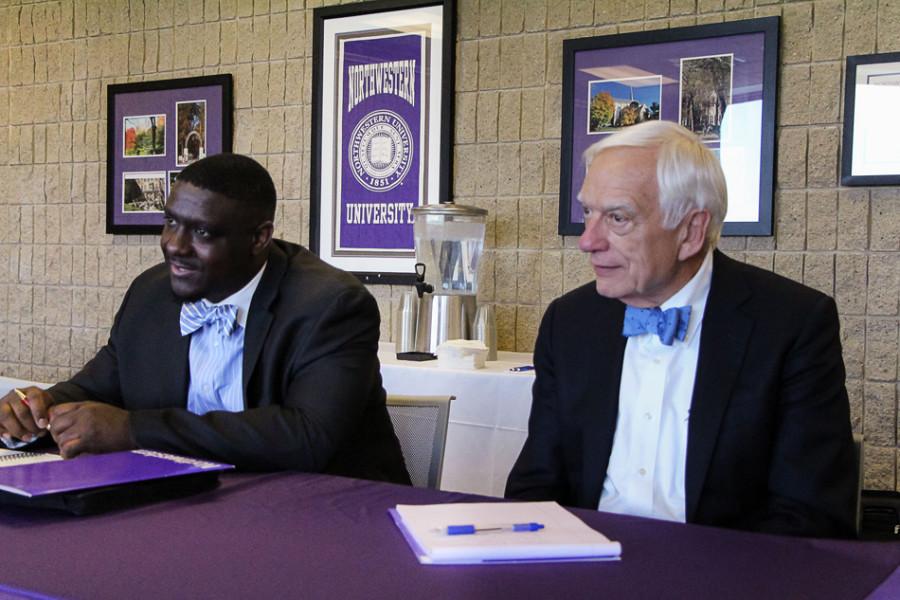Accreditation team holds open forums for students, faculty, staff
Madeline Fox/The Daily Northwestern
Freddie Wills (left), an administrator from Washington University in St. Louis, and Jim Bundschuh, former president of Marymount University, speak with students at an accreditation open forum. Seven team members from the Higher Learning Commission of the North Central Association of Colleges and Schools hosted forums Monday for students, faculty and staff as part of NU’s decennial accreditation process.
April 28, 2015
A team of higher education professionals heard student, staff and faculty concerns during a series of open meetings Monday as part of Northwestern’s decennial accreditation process.
Seven representatives from the Higher Learning Commission of the North Central Association of Colleges and Schools, an independent corporation that accredits U.S. universities, arrived at NU on Monday for a two-day visit. During the commission’s time on campus, the HLC will follow up on the University’s report, referred to as its “assurance argument,” and will review that the University is meeting the criteria for accreditation.
The forums, divided among three sections — one for students, one for faculty and one for staff, consisted of open-ended questions about the University and how members of the community interact with it. The HLC has been compiling its report since last summer.
“Our goal here is to talk face-to-face with the people this assurance argument is written about,” said Jim Bundschuh, former president of Marymount University and a member of the accreditation team who co-facilitated the student forum.
Bundschuh and Freddie Wills, a Washington University in St. Louis administrator, spoke with four students at the student forum: one fifth-year Ph.D. candidate, two members of the higher education and administration policy master’s degree program and an online student in the predictive analytics master’s program who called into the meeting.
The two administrators asked students questions about their thoughts on the University’s efforts to engage and inform students, its career services, what students like about NU and their perceptions of the University’s community engagement, among other issues.
NU is one of 57 other schools piloting the “Open Pathway” program, a new accreditation initiative from the HLC that intends to create a more efficient and effective assessment process. The program has universities choose a “Quality Initiative,” a major improvement it wants to focus on before its next accreditation. The program also uses existing institutional data for assessments, checks that data annually and conducts assurance reviews twice in the 10-year cycle.
“This is a little bit different because this is a new pilot process, so it’s a little bit more of a condensed visit than they had the last time,” said Jake Julia, NU’s associate provost for academic initiatives and associate vice president for change management. “It’s also a little bit of a smaller team than they had the last time.”
The accreditation team consists of higher education professionals in student affairs, central administration, finance, academic programs, student learning and other areas.
“The idea is that we’re in the same business, and we know the business of higher education, so all of us have different experience,” said Celestino Fernandez, the chair of the accreditation team and a sociology professor at the University of Arizona.
Fernandez was a member of the team that accredited NU in 1995. He said one of the places he has seen improvements in the past 20 years was in NU’s relationship with the Evanston community.
“Twenty years ago there was some conflict between the city and the University, and today the city and the University are working hand in hand,” Fernandez said. “It’s really nice to see the city and the community are working together, and that the community recognizes the value of this great university.”
Email: [email protected]
Twitter: @MadelineFox14


